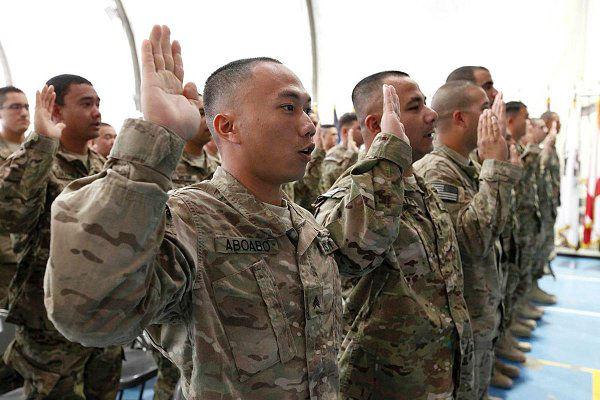Trump considers scrapping immigrant soldier scheme in move that could lead to deportations
The scheme was suspended under Barack Obama's administration

Your support helps us to tell the story
From reproductive rights to climate change to Big Tech, The Independent is on the ground when the story is developing. Whether it's investigating the financials of Elon Musk's pro-Trump PAC or producing our latest documentary, 'The A Word', which shines a light on the American women fighting for reproductive rights, we know how important it is to parse out the facts from the messaging.
At such a critical moment in US history, we need reporters on the ground. Your donation allows us to keep sending journalists to speak to both sides of the story.
The Independent is trusted by Americans across the entire political spectrum. And unlike many other quality news outlets, we choose not to lock Americans out of our reporting and analysis with paywalls. We believe quality journalism should be available to everyone, paid for by those who can afford it.
Your support makes all the difference.The Trump administration is considering cancelling a Pentagon programme to recruit immigrant recruits and fast-track them for citizenship - a move that could leave at least 1,000 trainee soldiers at risk of deportation.
The proposal to cancel the programme, which was established in 2009 to try and address a shortfall in specialised skills and language capabilities, was contained within a memo from Pentagon officials to Defence Secretary James Mattis. The memo, obtained by NPR, cites concerns about security and inadequate vetting of recruits.
Yet, any move to end the programme, known as the Military Accessions Vital to the National Interest, or MAVNI, would leave up to 1,000 new recruits at risk of being deported. Reports suggest the visas of these recruits have expired, and as they await naturalisation they have no protection.
The US military has long had history of welcoming non-citizens to fight for it. Frequently it was a way to help speed up applications for green cards or citizenship.
The MAVNI programme was established following a suggestion from Col Margaret Stock, who proposed the scheme as a way to attract recruits with skills such as surgery, or those who could speak languages such as Arabic. Its appeal to applicants was that it allowed applicants who were in the US legally, to bypass the green card process to become citizens.
Ms Stock, who now works as a lawyer in Anchorage, Alaska, said the decision would not only deny the military of a source of applicants with specialised skills, but was an act of bad faith.
“It's a classic example of bureaucratic bungling," she told The Independent. "We stopped recruiting immigrants into the military after Vietnam. That's why 9/11 happened. We could not read all the intelligence transcripts."
She said the decision to suspend the programme took place during Barack Obama's second term, when one official decided to order background checks it subsequently discovered it could not afford to carry out.
She added that the downsides to the cancellation of the programme were obvious: Paul Chelimo, a Kenyan-born American athlete who won silver in the 5,000 metres at the 2016 Rio Olympics, secured US citizenship after entering the US Army through the MAVNI progamme in 2014.
Some of the 10,000 or so trainee soldiers recruited under MAVNI, which is currently on hold, are have filed lawsuits alleging discrimination and breach of agreement.
A lawyer representing the plaintiffs in one of the suits, Neil O'Donnell, said the men were victims of "rampant paranoia". "Lots of people are in limbo," he said.
Johnny Michael, a spokesman for the Department of Defence, said in a statement: “The department is reviewing the requirements associated with this pilot programme and we are unable to provide detailed responses at this time.”
Join our commenting forum
Join thought-provoking conversations, follow other Independent readers and see their replies
Comments